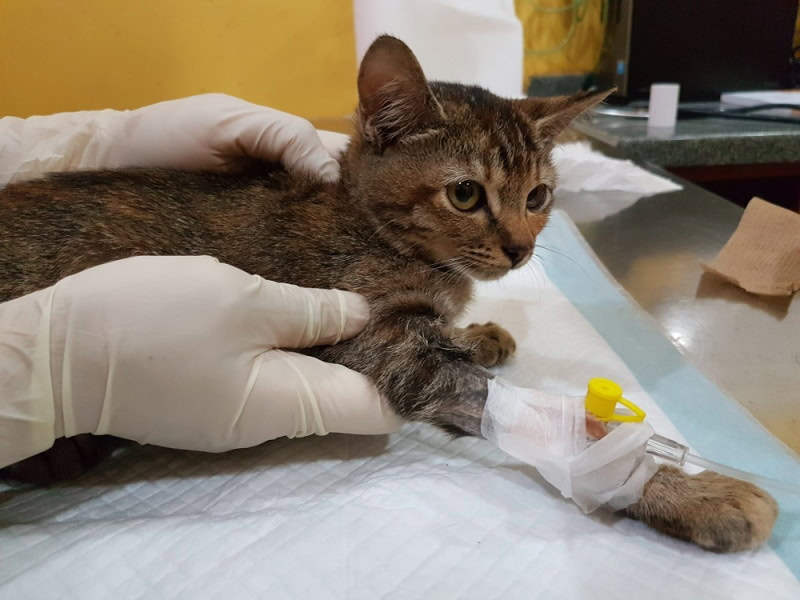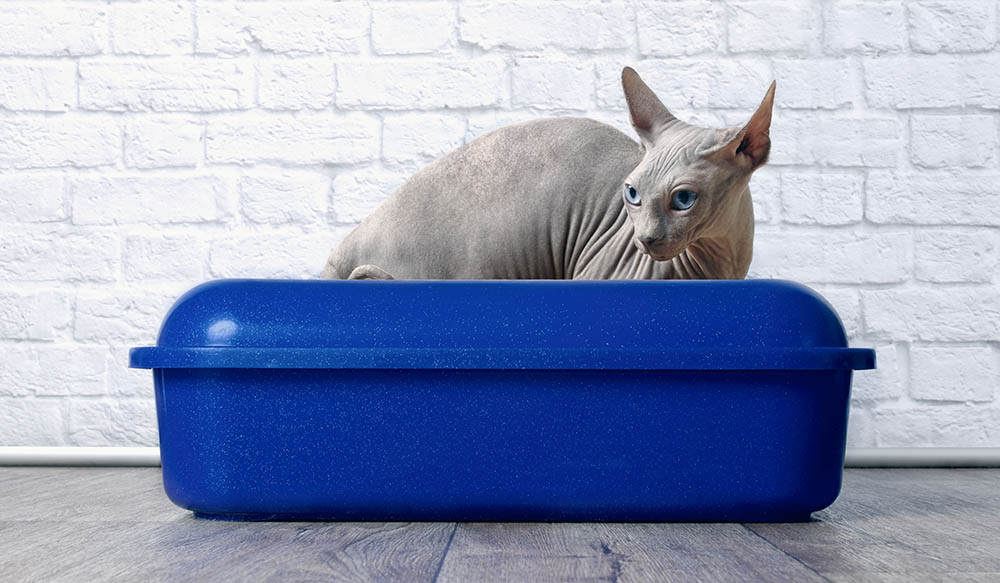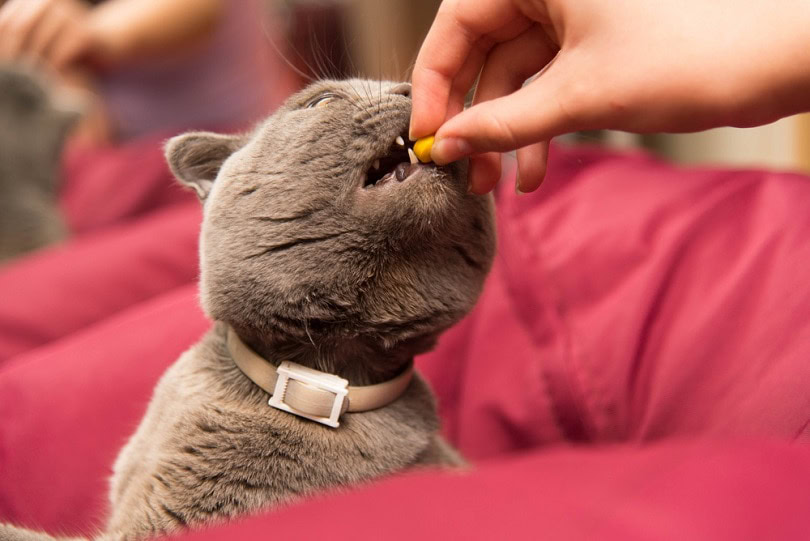VET APPROVED

The information is current and up-to-date in accordance with the latest veterinarian research.
Learn more »Click to Skip Ahead
Cancer is a devastating diagnosis for both humans and animals. When your cat is diagnosed with cancer, you may feel stressed not only for your beloved pet but by the financial pressures of treatment. You love your cat and want to do everything you can to make sure they have a comfortable life for as long as possible. One option you may be considering is chemotherapy.
Depending on the type of chemotherapy your cat may need, you can be looking at a $75–$300 price tag per dose of oral chemotherapy or even up to $600 or more for each round of IV chemotherapy, alongside required ongoing blood tests and monitoring. However, as the prices can vary greatly depending on the drug or protocol needed, it’s important to consult with your veterinary oncologist for a more accurate estimate of ongoing costs.
Chemotherapy can be an effective treatment for some cats with cancer, depending on the diagnosis and stage of illness, and it may extend their life by several months or even years. Below is a cost guide to help you begin to estimate what might be involved in seeking out chemotherapy as a cancer care option for your cat.

The Importance of Chemotherapy
Depending on your cat’s diagnosis, several cancer treatments may be recommended, including surgery, radiation, immunotherapy, cryotherapy, and chemotherapy. Radiation is typically the most expensive treatment option; chemotherapy and surgery may be somewhat less costly, depending on the type of cancer. There are a number of costs associated with cancer in cats and, often, chemotherapy may be just one part of that picture. Some cats will require surgery as well as chemotherapy.
Most forms of cancer treatment for pets are a way to extend life rather than aim to fully cure cancer. Cancer treatment might extend the life of your pet anywhere from a few months to even more than a year, depending on the stage of their illness and type of cancer.
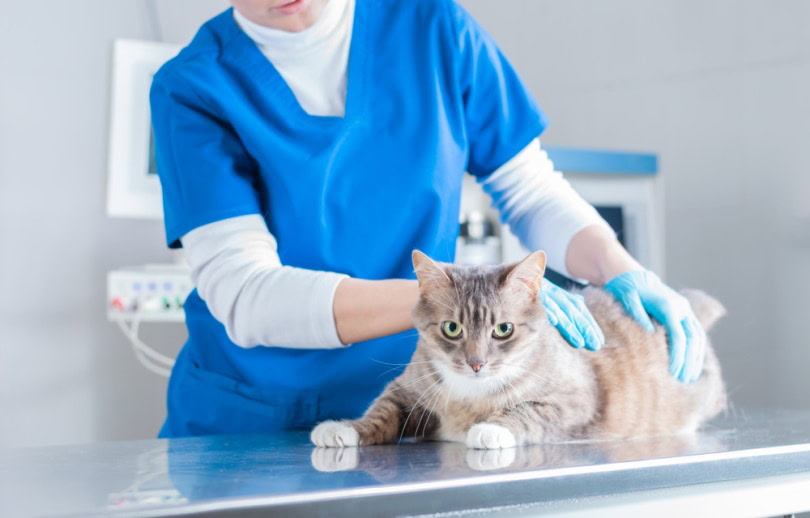
What Types of Cancer Do Cats Typically Get?
The incidence of cancer in cats is somewhat lower than that in dogs. However, analysis of canine and feline cancer records has shown that cats have a fourfold risk of malignant tumors when compared to dogs. It is, therefore, important to catch cancer early and treat it as soon as possible.
Lymphoma is a cancer of the lymphatic system and is the most common type of cancer found in cats. It is usually associated with the feline leukemia virus (FeLV), which is why it is important to have your cat tested for this virus if they are displaying any signs of illness.
Leukemia is a cancer of the blood cells and can be either acute or chronic. Acute leukemia is more severe and rapidly progresses, while chronic leukemia is more slowly progressive.
Another type of cancer found in cats is oral squamous carcinoma, which affects the inside of your cat’s mouth. Tumors such as fibrosarcoma or soft tissue carcinoma impact the connective tissue and muscle in the body, injection-site sarcoma, which can appear where your cat has received multiple injections and mammary tumors are also seen.
This is by no means an exhaustive list of all the cancers a cat might develop, but these are some of the types most commonly seen.
How Much Does Chemotherapy Cost?
As previously stated, chemotherapy is just one of a few ways to treat your cat’s cancer, and it may be used alone or in combination with other treatments. A lot of the cost depends upon the type of cancer your cat has, the age and health of your cat, and whether cancer treatment is being offered as palliative care to relieve acute suffering or as a way to extend the life of your cat.
A lot of the cost depends upon the type of cancer your cat has, which determines the length of the treatment, the cost of the drugs used, and how they are administered. There are several ways to administer various drugs that may be a part of the chemotherapeutical protocols: intramuscular (in the muscle), intralesional (directly into the tumor), subcutaneous (under the skin), intravenous (in the vein), and oral (by mouth). Other chemotherapeutic options may include radiation, immunotherapy or surgery, or a combination of two or more.
For palliative care, your cat may only take doses as needed to ease the pain and reduce the signs of illness. For ongoing treatment plans, your cat may need a dose every few days, to every week, to every few weeks depending on your doctor’s recommendation and specific chemotherapy protocol.
| Initial Consult for Cancer Treatment: | $125–$250* |
| Oral Chemotherapy or Palliative Care: | $150–$600 per dose** |
| Oral Chemotherapy (note you will need multiple doses): | $150–$600 per dose** |
| IV Chemotherapy: | $600 or more per one round |
| Radiation: | From $1000 to $6000, depending on the protocol** |
*taken from carecredit.com
**taken from vetcancersociety.org
Additional Costs to Anticipate
There are a number of additional costs to anticipate when your cat is undergoing chemotherapy. Some veterinary hospitals may offer various packages that combine reduced costs of recheck exams and recheck blood work, in addition to the cost of the actual chemotherapy medications themselves. It is good to check what is included in your chemotherapy treatment package because bloodwork and labs can add additional costs.
Pet oncology is also a relatively new field, and that can mean wait times for doctors as well as finding an oncology specialist in your area can be difficult. Most people will find they need to travel to find specialized cancer care for their pets. You may need to account for a few hours of travel to reach your closest cancer care center. Therefore, the costs of time and travel may drive up your overall costs.
Cats do not have the same reaction to chemotherapy as humans, and their side effects tend to be milder; however, they can still have some similar signs, such as pain, nausea, vomiting, loose stools, loss of appetite, immunosuppression, and impact on various organ systems. Your veterinarian can prescribe pain and nausea medications to help relieve some of these issues.
People also explore holistic medicine options, such as Chinese medicine, homeopathy, or acupuncture for their pets. These modalities are growing in popularity not only for humans but also for pets today. These can be costly but helpful ways to support your pet’s well-being as they travel on this journey.
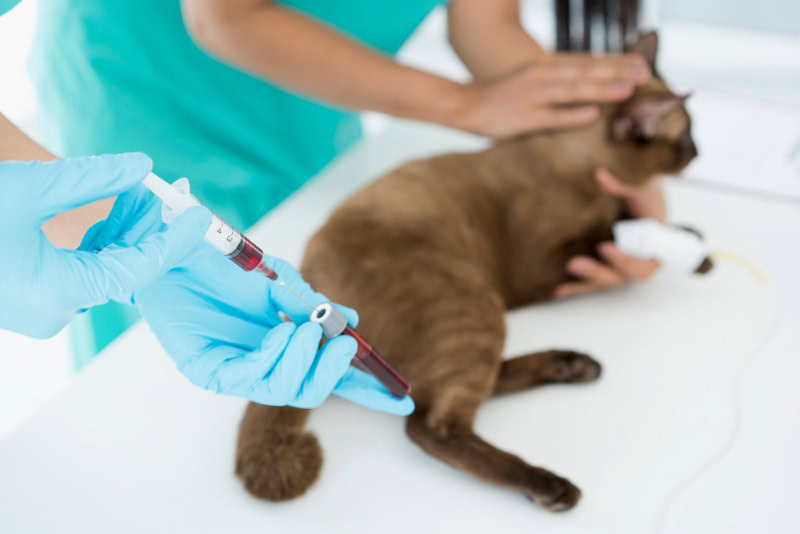

Does Pet Insurance Cover Cat Chemotherapy?
Yes, many insurance companies will cover part or all of a cat’s cancer care as long as it meets its conditions and isn’t considered part of a pre-existing or hereditary condition. This is a good option for pet owners who have had the foresight to purchase their pet’s insurance when they were younger.
Of course, there may be considerations in how the companies pay and what they will cover, so it is best to check directly with your specific insurance company. Many people have to pay out of pocket and then work to get their claims recognized by their respective insurance companies.
Other Resources to Help Pay for Your Pet’s Cancer Treatment
There are several organizations that have been created just to support pet owners with catastrophic medical costs.
One company, Pet Assure, offers discounts on veterinary treatments at clinics from its network in exchange for a monthly subscription fee. They do not have exclusions based on your pet’s age, pre-existing health history, or hereditary conditions. This is a great option to try and reduce your pet’s overall medical costs.
Other organizations target specific breeds or types of cancer by offering medical grants for treatment. Many of these are compiled here. It is definitely worth some research to see if your pet’s care could be covered by a charitable organization.
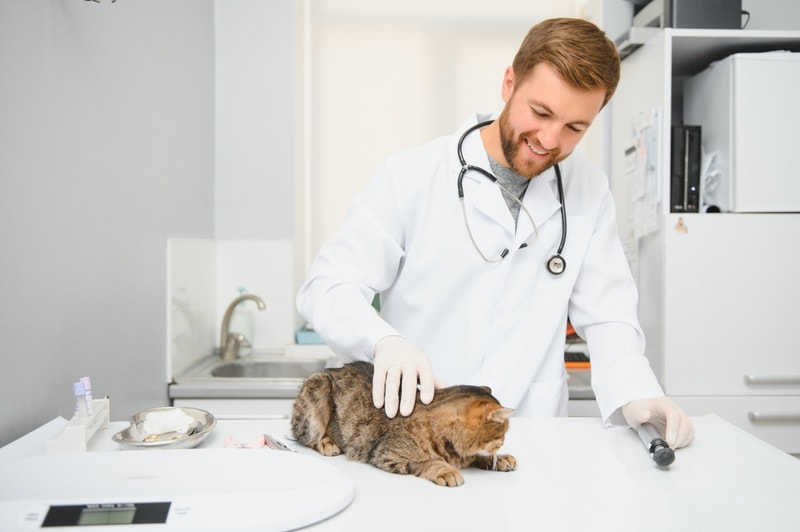

Conclusion
The cost of cancer care for your cat can be very expensive. However, there are many ways to help offset the costs. Some organizations can help with the cost of treatment, and there are also ways to help care for your cat at home. The most important thing is to keep your cat comfortable and supported with the help of your vet during this difficult time.
- Chemotherapy and Pets – BluePearl Pet Hospital
- My dog needed advanced cancer treatment. The price tag stunned me.
- Pet Owner Resources – Veterinary Cancer Society
- Pet Owner Resources – Veterinary Cancer Society
- Cats, Cancer and Comparative Oncology – PMC
- Vet-OncoNet: Malignancy Analysis of Neoplasms in Dogs and Cats – PMC
- Common Types of Cancer in Cats – UW Veterinary Care
- My dog needed advanced cancer treatment. The price tag stunned me.
- The heartbreak and high costs of pet cancer – CBS News
Featured Image Credit: Raihana Asral, Shutterstock
